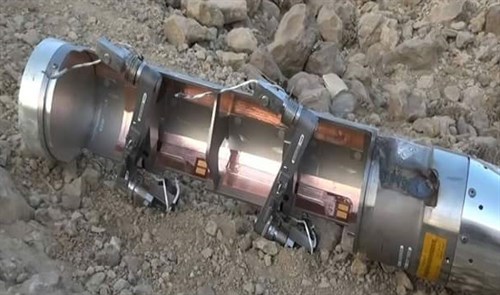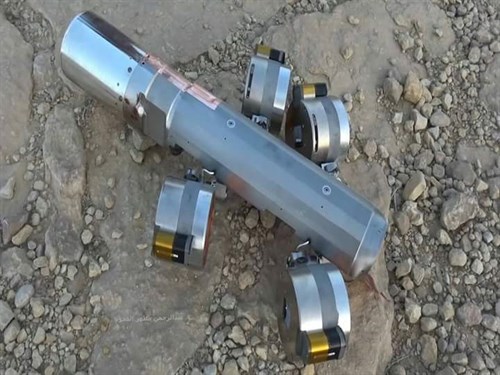04 May 2015
Yemen bombarded with cluster munitions
Coalition leader Saudi Arabia previously denied using the weapon

An expended BLU-108 canister from a CBU-105 Sensor Fuzed Weapon found in the al-Amar area of al-Safraa, Saada governorate, in northern Yemen on 17 April 2015. (c)2015 Private
-- Update 11 May 2015 --
Saudi Arabia admits use of CBU-105 sensor-fuzed weapons in Yemen:
Report: Saudi Arabia used U.S.-supplied cluster bombs in Yemen, CNN International, 4 May 2015
States and opinion leaders react:
Costa Rica, President of the Convention on Cluster Munitions, condemns use of cluster munitions in Yemen: Costa Rica condena el uso de municiones en racimo en Yemen, 5 May 2015
Croatia, President-Designate of the First Review Conference of the Convention on Cluster Munitions, is sad and dismayed by the news of cluster munition use in Yemen, calls on states to choose the right side of history
Queen Noor of Jordan says use of cluster munitions would be a terrible sin
United States' Department of State says it is looking into those details carefully
Norway condemns use of cluster munitions in Yemen, calls on more states to join the Convention on Cluster Munitions
Sample media coverage:
Saudi Arabia accused of using cluster bombs in Yemen air strikes, Financial Times, 3 May 2015
Yemen: Saudi Arabia used cluster bombs, rights groups says, BBC News, 3 May 2015
"Saudis condemned cluster bombs in Syria but used banned munitions in Yemen?", RT TV-Novosti Interview with Megan Burke, CMC Director, 3 May 2015
U.S.: Saudis Can Use Cluster Bombs in Yemen, But Only if They’re Extra Careful, The Cable, Foreign Policy, 4 May 2015
Human Rights Watch: Saudi-Led Coalition Bombing Yemen with Banned U.S.-Made Cluster Munitions, Democracy Now Interview with Steve Goose, CMC Chair, 5 May 2015
--Original post 4 May 2015 --
Geneva, 4 May 2015 - The Coalition led by Saudi Arabia used cluster munitions in strikes over Yemen that started on 26 March, including near villages, according to credible evidence gathered by Human Rights Watch.
This, despite the fact that, at a news conference in Riyadh on 29 March, a representative of Saudi Arabia, Brig. Gen. al-Assiri, had told the media: "We are not using cluster bombs at all."
The Coalition comprises Bahrain, Egypt, Jordan, Kuwait, Morocco, Qatar, Sudan, and the United Arab Emirates. The United States provides logistics and intelligence support.
"While none of these states are parties to the Convention on Cluster Munitions, they should all respect the principles of International Humanitarian Law," said Megan Burke, Director of the Cluster Munition Coalition. "Available data on past use says that 94% of cluster munition victims are civilians and many of these are children. Using these weapons is in direct contradiction with International Humanitarian Law. Any use by any actor under any circumstances is unacceptable."
Human Rights Watch identified remnants of two CBU-105 Sensor Fuzed Weapons manufactured by the Textron Systems Corporation and supplied to Saudi Arabia and the United Arab Emirates by the United States in recent years. It is believed that these were used in recent weeks, including before 17 April and possibly as recently as 27 April.
A BLU-108 canister with four submunitions still attached found in the al-Amar area of al-Safraa, Saada governorate, in northern Yemen on April 17, 2015. (c)2015 Private
While the CBU-105 is banned under the Convention on Cluster Munitions, its use is permitted under existing US policy and its export is permitted under the existing US export restrictions on cluster munitions.
"The cluster munitions identified in Yemen are produced by an American company in which financial institutions worldwide are still investing billions of dollars. These investments make it possible for this horrendous weapon to be produced,” explained Suzanne Oosterwijk from PAX, who leads a campaign against financial investments in cluster munitions, jointly with the CMC.
On 27 March, the Cluster Munition Coalition had called on Saudi Arabia and others not to use cluster munitions.
The Cluster Munition Coalition condemns the use of cluster munitions in Yemen and calls on coalition members to ensure no future use.
There is credible evidence that Saudi Arabia had also previously used cluster bombs in air strikes on Yemen's northern Sada'a governorate, in November 2009.
New York Times article: Saudi-Led Group Said to Use Cluster Bombs in Yemen


